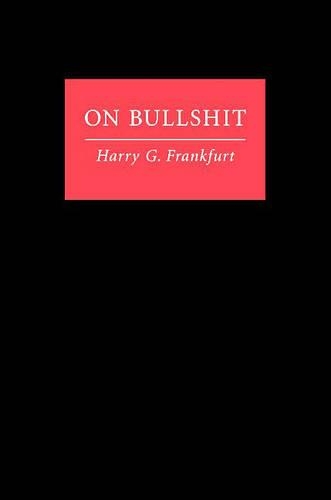
On Bullshit
(Hardback)
Available Formats
Publishing Details
On Bullshit
By (Author) Harry G. Frankfurt
Princeton University Press
Princeton University Press
11th April 2005
United States
Classifications
General
Non Fiction
177.3
Physical Properties
Hardback
80
Width 102mm, Height 152mm
113g
Description
One of the most salient features of our culture is that there is so much bullshit. Everyone knows this. Each of us contributes his share. But we tend to take the situation for granted. Most people are rather confident of their ability to recognize bullshit and to avoid being taken in by it. So the phenomenon has not aroused much deliberate concern. We have no clear understanding of what bullshit is, why there is so much of it, or what functions it serves. And we lack a conscientiously developed appreciation of what it means to us. In other words, as Harry Frankfurt writes, "we have no theory." Frankfurt, one of the world's most influential moral philosophers, attempts to build such a theory here. With his characteristic combination of philosophical acuity, psychological insight, and wry humor, Frankfurt proceeds by exploring how bullshit and the related concept of humbug are distinct from lying. He argues that bullshitters misrepresent themselves to their audience not as liars do, that is, by deliberately making false claims about what is true. In fact, bullshit need not be untrue at all.Rather, bullshitters seek to convey a certain impression of themselves without being concerned about whether anything at all is true. They quietly change the rules governing their end of the conversation so that claims about truth and falsity are irrelevant. Frankfurt concludes that although bullshit can take many innocent forms, excessive indulgence in it can eventually undermine the practitioner's capacity to tell the truth in a way that lying does not. Liars at least acknowledge that it matters what is true. By virtue of this, Frankfurt writes, bullshit is a greater enemy of the truth than lies are.
Reviews
Winner of the 2005 Bestseller Award in Philosophy, The Book Standard "[Frankfurt] tries, with the help of Wittgenstein, Pound, St. Augustine and the spy novelist Eric Ambler, among others, to ask some of the preliminary questions--to define the nature of a thing recognized by all but understood by none... What is bullshit, after all Mr. Frankfurt points out it is neither fish nor fowl. Those who produce it certainly aren't honest, but neither are they liars, given that the liar and the honest man are linked in their common, if not identical, regard for the truth."--Peter Edidin, New York Times "The scholar who answers the question, 'What is bullshit' bids boldly to define the spirit of the present age... Frankfurt's conclusion ... is that bullshit is defined not so much by the end product as by the process by which it is created. Eureka! Frankfurt's definition is one of those not-at-all-obvious insights that become blindingly obvious the moment they are expressed."--Timothy Noah, Slate "Immediately, I must say: read it. Beautifully written, lucid, ironic and profound, it is a model of what philosophy can and should do. It is a small and highly provocative masterpiece, and I really don't think I am bullshitting you here."--Bryan Appleyard, The Sunday Times (London) "This is what the world has long needed... Bullshit is now such a dominant feature of our culture that most of us are confident we can recognize and rebuff it. But Frankfurt shows the reader just how insidious (and destructive) it can be... This book will change your life."--Leopold Froehlich, Playboy "Frankfurt's book should be required reading for anyone whose speech or writing are intended for public consumption. Despite his subject, he is definitely not full of it."--Kevin Wood, The Daily Yomiuri "On Bullshit offers a tightly focused, telling critique of a political and cultural climate that seems positively humid with mendacity, obfuscation, evasion and illusion."--Steven Winn, San Francisco Chronicle "There is an interesting problem sketched at the end of the book, wherein sincerity is described as an ideal for those who do not believe that there is any (objective) truth, thus departing from the ideal correctness... Needless to say, there are numerous problems which may be expanded, looked into and analyzed concerning bullshit. And I dare say that Frankfurt's little book is a nice starting point."--Petter A. Naessan, Philosophy Now "[On Bullshit's] calm, clearheaded deconstruction of everyday deceit is without parallel."--Gordon Phinn, Books in Canada "With its relevance to contemporary issues and culture, On Bullshit is well worth the read... The analysis is strict and philosophical with the clear intention of seeking the truth."--Karen Boore, The Michigan Review "Harry Frankfurt, a Princeton philosophy professor, presents a scholarly and formal essay on inflated truth, purposeful obfuscation, and pretentious duplicity... I'm sure he had a blast writing it, and the droll prose is a tasty treat."--Richard Pachter, The Boston Globe "Professor Frankfurt concludes that bullshit is a process rather than an end product... If you are fed up with hype, spin and bullshit this book will provide insight - and therapy."--Australian Doctor "Terrific... Has anything truer ever been written"--William Watson, Montreal Gazette "If you want to read a succinct, stylish piece of argument that will make you think far beyond the points it makes, you could do no better than invest ten dollars on Professor Frankfurt's handsomely bound essay."--Christopher Jary, British Army Review
Author Bio
Harry G. Frankfurt is Professor of Philosophy Emeritus at Princeton University. His books include "The Reasons of Love" (Princeton), "Necessity, Volition, and Love", and "The Importance of What We Care About".
